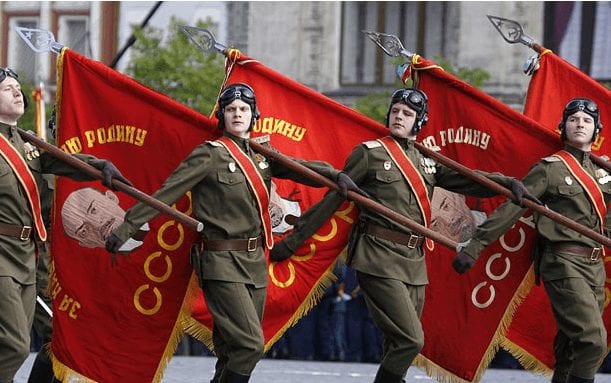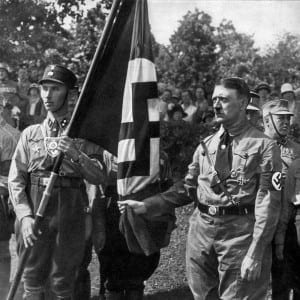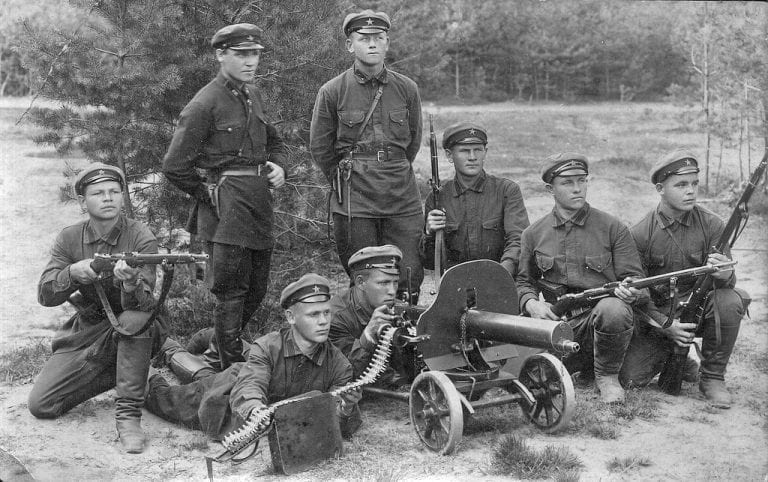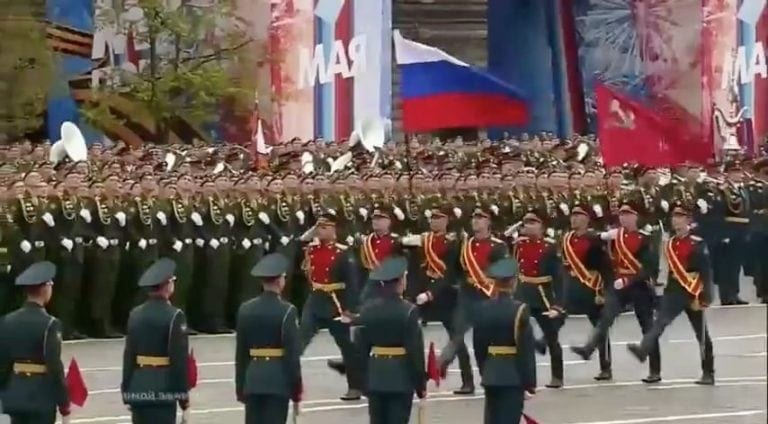
A civilization reveals itself as fruitful by its ability to incite others to imitate it: when it no longer dazzles them, it is reduced to a mere collection of odds and ends and vestiges of former worldly greatness. The successive attempts of Napoleon and Hitler to create a world empire failed, as the United States of North America has failed in our time because any initial attraction they might have exerted on the conquered transformed into resistance and hate as a result of their genocidal policies or military occupation and/or exploitation of the resources of the conquered lands instead of gradual absorption and acceptance of different peoples and the furthering of local cultures. (Paraphrased from Cioran’s Histoire et Utopie)
The goal of the brutal Mongol domination of Russia (1240-1480) was even more ruinous than imperialism as we know it in our times. It was the physical destruction, occupation and colonialization of the known world of its times. Militarily the Mongol (Tatar) invasion was devastating, its historical effect ambivalent and long-range significance immeasurable. After widespread destruction and massacres of the populations from China to Germany, the Mongols reigned over most of Russia from their capital near the Caspian Sea; however, they mingled little in everyday Russian life—demanding chiefly financial tributes and recognition of their domination—during which centuries they themselves were gradually assimilated. Russian historians are therefore divided between those who pay only passing attention to the Mongol domination—known as the Mongol yoke—and those who stress its destructive influence on Russia.

13th Century Russian prince (and saint, later) Alexander Nevsky was victorious against the German knights and their allies, but had to accommodate his power to the Mongol presence throughout Russia and beyond. (In the still from S. Eisenstein classic, Alexander Nevsky, the hero refuses the mongol ambassador’s invitation to join the Golden Horde.)
Perhaps the most enduring effect of the Mongol yoke was to cut off the dominated Russian lands from the West causing Russia to look eastwards so that the Russian civilization did not experience the Renaissance of the West. On the other hand, as the philosopher Nicolas Berdyaev writes in The Origin of Russian Communism: “the immensity of those territories to the East, the absence of boundaries, came to be expressed in the breadth of the Russian spirit.”
Later rulers like Peter the Great who built St. Petersburg turned the Russian outlook westwards by force; yet the divisions persisted between Russia’s Westernizers who still look westwards and Slavophiles who cling to pure Russian traditions. The latter outlook is much in vogue today, buttressing Russia’s cold shoulder toward U.S. imposed economic sanctions.
It seems inconceivable to this observer that such a people, after the two centuries of the Mongol yoke, its cities destroyed and Moscow burned by Napoleon, and Nazi armies who laid waste to country up until their defeats at Leningrad, Moscow and Stalingrad costing however 27 million Russian, that such a people is now in a position to be on the point of becoming the world’s third economic power, that this people that has suffered harshly throughout its history can claim not to give a damn about America’s sanctions, (sanctions already opposed—out of self-interest—by some of America’s own European allies).
Moreover: Russia’s claims to be the savior of the West finds also historical justification in its having stopped and absorbed the brunt of the Mongol attacks on the West after which Russia paid the additional price of two centuries of servitude and exclusion from the rest of the world. In any case, during its period of exclusion Russia, retreating as always on itself, became increasingly conscious of its roots—also in its Eastern occupiers as according to the old expression: ‘Scratch a Russian and find a Tatar’—while Russia was becoming increasingly powerful before it centuries later adopted Marxism on which however it gave its Slavic imprint with its vestiges of the East which eventually marked also the Russian revolution itself.
That Asiatic-socialist mark not only survives but flourishes today in its capitalist society which bears definite Marxist collective overtones demonstrating that when a people with the wide breadth of view of Russians—its special and differentiating mirovozreniye—gained from its land expanses and its history adopts a foreign ideology so powerful as Marxism, that people assimilates and changes its nature: Lenin was a Marxist but he changed the essence of Marxism to suit Russia’s needs; Lenin never conceived of Russian Socialism/Communism as utopian; it was hard reality geared to Russia’s needs of the moment. Also for that reason, though the USSR dissolved, Marxism-Leninism remains in contemporary Russia and has already changed Russian society fundamentally. (And the heroic Russian army still flies the communist emblems on its uniforms and gear.)

Russian tanker crews parade in victory celebration over fascism (2013). The red star is affixed to all of Russia's tanks, navy and aviation equipment.
It has been said that the Russians were always socialistic, a trait engrained in its illiterate peoples long before the revolution. Russian revolutionaries were always ideological, it was in their blood. So it is no surprise that Lenin wrote in What Is To Be Done: "It is either bourgeois or socialist ideology. There is no middle road here … Therefore any belittling of socialist ideology, any alienation from it signifies the strengthening of the bourgeois ideology.” Russian people could understand him perfectly. And no wonder that The Communist Party of the Russian Federation with a program of Socialism for Russia had 570,000 members in 2015, the second Party in Russia, while recent polls show that more than 50% of Russians favor a return to the USSR.
Russian Expansionism
[dropcap]I[/dropcap]n American propagandistic terms Russia’s expansionism is labeled imperialist aggression, citing as examples the annexation of (Russian) Crimea and the invention of Russian intervention in Ukraine and in the ridiculous and unfounded claims of Russian intervention in the U.S. presidential elections. There is a basic difference between American imperialism and aggression—which began with the Mexican War in 1846 and has since never ceased on a worldwide scale that the Mongols would admire—and Russia’s expansion to the East from European Russia to the Pacific. Not only was this expansion in the nature of an empire which stood with its back to the West and facing eastwards at a huge but extremely sparsely occupied territory, containing enormous wealth. That is what the West in general and the USA in particular envy Russia for: its natural wealth much of which is still buried under the soil beyond the Ural Mountains. Why should they have all that wealth? is the U.S. attitude, part of the justification for its great plot to subjugate Russia and split it up into small states.

Consistently encouraged by the West, Hitler eventually moved against Russia, wounding her terribly but being destroyed in the process.
Things changed dramatically when first the Russian empire, then the great Communist “beast”, turned westwards, first to defeat Napoleon, then to win World War II—again for the West as it had done against the Mongols. Revolutionary Communist Russia’s victory proved to be nearly unforgiveable in the West. As if it wanted to continue its march on from Berlin to Paris and Rome. Cossacks in the fountains of the Eternal City. Had Russian Slavophiles not always maintained that Russia was ‘destined to save the world’?
However, as Cioran wrote that claim was merely euphemistic. The bare expression “save the world” (i.e. save the West) did not mean to dominate it. In reality, spiritual Russia has always felt both love and hate, attraction and repulsion, jealousy and aversion inspired by a rottenness (of the West), both enviable and dangerous, with which contact is sought as well as evaded.
To be remembered: The soul of the Russian people was molded by the Orthodox Church. After the fall of the Byzantine Empire, called the Second Rome, which was the greatest Orthodox state in the world, the Russian Orthodox Church remained as the home of Orthodoxy. Thus emerged the idea of Moscow as the Third Rome. “Two Romes had fallen, but the third stands … and there will be no fourth.” The doctrine of Moscow the Third Rome became the basic idea of the former Moscow state. Its symbol was the messianic idea of that state. Tsar Ivan the Terrible ruled over a totalitarian state to the degree that among the people emerged the conviction of a plot of the Church hierarchy and State to betray the true faith. On which the people broke with Church and State and went underground from which arose the legend of the (pure) City of Kitezh hidden beneath a lake, a city that guaranteed social justice, another fundamental trait of the Russian people: the search for social justice as exemplified by the imaginary Utopian City of Kitezh.

During The Great War, the Russians suffered major setbacks for several years. but eventually, at enormous cost, they turned the Nazi tide. The Red Army proved invincible.
Intellectual asceticism, nihilism and materialism were traits of the nineteenth century Russian revolutionary character among the intelligentsia, qualities superimposed on the inherent sense of social justice among a largely illiterate people. Nihilism cannot be overemphasized in an understanding of Lenin’s generation of revolutionaries. Berdyaev defines Russian nihilism as “a revolt against the injustices of history, against false civilization, a demand that history shall come to an end, and a new life, outside or above history, begin….a demand for nakedness, for the stripping from oneself of all the trappings of culture, for the annihilation of all historical traditions, for the setting free of the natural man, upon whom there will no longer be fetters of any sort.”

Soviet soldiers hoisting the red flag over Brandenburg Gate in Berlin.
Such was the maximalist nature of the Russians (which became ideology) who then became the revolutionaries who in October of 1917 made the greatest revolution of our times that still appeals to major parts of mankind and changed the history of the world.

 GAITHER STEWART Senior Editor, European Correspondent } Gaither Stewart serves as The Greanville Post European correspondent, Special Editor for Eastern European developments, and general literary and cultural affairs correspondent. A retired journalist, his latest book is the essay asnthology BABYLON FALLING (Punto Press, 2017). He’s also the author of several other books, including the celebrated Europe Trilogy (The Trojan Spy, Lily Pad Roll and Time of Exile), all of which have also been published by Punto Press. These are thrillers that have been compared to the best of John le Carré, focusing on the work of Western intelligence services, the stealthy strategy of tension, and the gradual encirclement of Russia, a topic of compelling relevance in our time. He makes his home in Rome, with wife Milena. Gaither can be contacted at gaithers@greanvillepost.com. His latest assignment is as Counseling Editor with the Russia Desk. His articles on TGP can be found here.
GAITHER STEWART Senior Editor, European Correspondent } Gaither Stewart serves as The Greanville Post European correspondent, Special Editor for Eastern European developments, and general literary and cultural affairs correspondent. A retired journalist, his latest book is the essay asnthology BABYLON FALLING (Punto Press, 2017). He’s also the author of several other books, including the celebrated Europe Trilogy (The Trojan Spy, Lily Pad Roll and Time of Exile), all of which have also been published by Punto Press. These are thrillers that have been compared to the best of John le Carré, focusing on the work of Western intelligence services, the stealthy strategy of tension, and the gradual encirclement of Russia, a topic of compelling relevance in our time. He makes his home in Rome, with wife Milena. Gaither can be contacted at gaithers@greanvillepost.com. His latest assignment is as Counseling Editor with the Russia Desk. His articles on TGP can be found here.
 In his zeal to prove to his antagonists in the War Party that he is as bloodthirsty as their champion, Hillary Clinton, and more manly than Barack Obama, Trump seems to have gone “play-crazy” -- acting like an unpredictable maniac in order to terrorize the Russians into forcing some kind of dramatic concessions from their Syrian allies, or risk Armageddon.However, the “play-crazy” gambit can only work when the leader is, in real life, a disciplined and intelligent actor, who knows precisely what actual boundaries must not be crossed. That ain’t Donald Trump -- a pitifully shallow and ill-disciplined man, emotionally handicapped by obscene privilege and cognitively crippled by white American chauvinism. By pushing Trump into a corner and demanding that he display his most bellicose self, or be ceaselessly mocked as a “puppet” and minion of Russia, a lesser power, the War Party and its media and clandestine services have created a perfect storm of mayhem that may consume us all.— Glen Ford, Editor in Chief, Black Agenda Report
In his zeal to prove to his antagonists in the War Party that he is as bloodthirsty as their champion, Hillary Clinton, and more manly than Barack Obama, Trump seems to have gone “play-crazy” -- acting like an unpredictable maniac in order to terrorize the Russians into forcing some kind of dramatic concessions from their Syrian allies, or risk Armageddon.However, the “play-crazy” gambit can only work when the leader is, in real life, a disciplined and intelligent actor, who knows precisely what actual boundaries must not be crossed. That ain’t Donald Trump -- a pitifully shallow and ill-disciplined man, emotionally handicapped by obscene privilege and cognitively crippled by white American chauvinism. By pushing Trump into a corner and demanding that he display his most bellicose self, or be ceaselessly mocked as a “puppet” and minion of Russia, a lesser power, the War Party and its media and clandestine services have created a perfect storm of mayhem that may consume us all.— Glen Ford, Editor in Chief, Black Agenda Report 







